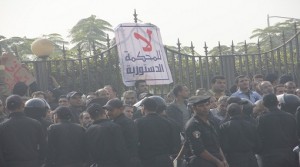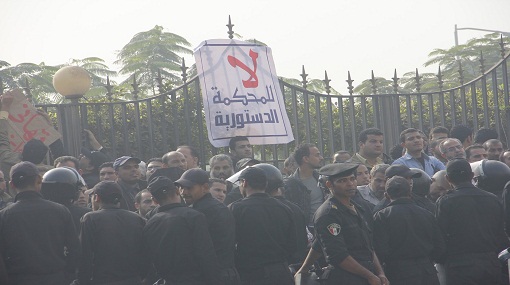
Photo from: Masrawy.com
The Supreme Constitutional Court (SCC) is set to resume its work tomorrow, some six weeks after it was forcibly suspended when supporters of the ruling political party besieged the court to prevent it from convening to consider the constitutionality of the elections law, which could affect the legality of the Shura Council as well as of the Constituent Assembly.
The siege was maintained with complicity from all executive and legislative state institutions, including the President’s Office, the Interior Ministry, and the Ministry of Justice, and press statements to the contrary do not clear them of their involvement in preventing the court from convening. While the siege was in place, the Constituent Assembly hastily completed its work and a referendum was held on the proposed constitution, leaving no time for a national debate – nor even a discussion among specialists – to take place regarding the document.
Prior to the revolution, tailor-made laws were promulgated to serve the interests of the ruling regime. Now, the constitution itself has been specifically crafted to serve the interests of the ruling party. The new constitution fulfilled the demands of those who had besieged the SCC by reducing the number of justices on the court by 40 percent and subjecting the composition of the court to presidential review. The new constitution further limits the court’s already restricted prerogatives. Despite such challenges, the court was still able to issue some important rulings challenging the former regime and supporting human rights and democracy.
The recent attacks on the SCC were preceded by a political campaign on both the national and international levels to portray the court as a body run by loyalists of former president Hosni Mubarak and a tool in the hands of his regime. It was alleged that through its post-revolution rulings, the court sought to undermine the revolution and to restore the former regime. Other judicial bodies, such as the State Council, were similarly targeted by the smear campaign.
Paradoxically, the Mubarak regime’s media used to accuse the Egyptian judiciary of being loyal to the Muslim Brotherhood when Mubarak failed to obtain convictions for Muslim Brotherhood leaders and members before civilian courts. Mubarak then turned to military tribunals instead, as they represented the only sure means of trying and imprisoning leaders of the group.
When the Muslim Brotherhood assumed power, it was expected that they would honor civilian courts while targeting military courts out of retaliation. However, the constitutional declaration issued in November struck a severe blow to civilian courts, while military trials for civilians have become protected under the constitution for the first time in Egypt’s history.
This is not to say that the Egyptian judiciary enjoyed full independence under the Mubarak regime, but rather relative independence. After the revolution, it was hoped that judicial autonomy would be strengthened, including through supporting the role and independence of the SCC. However, the role of the SCC has been undermined, even under the auspices of some of the most prominent members of the judges’ movement for judicial independence who recently assumed prominent roles in the government.
The SCC has an honorable history of supporting steady change, illustrated in several historical rulings that came down on the side of democracy and human rights. The SCC must be placed in its historical context to understand its role in reforming the Egyptian judicial system and in issuing legal precedents in support of democracy and human rights.[1]
In the face of Mubarak and his regime, the SCC consistently affirmed the right to political participation by overturning laws designed to limit it. For example, the court reinstated the political rights of several prominent opposition figures in rulings issued in 1986[2] and 1987[3], which found that Articles 4 and 5(a) of Law 33/1978 on the Protection of Social Peace had restricted the right to political participation in violation of the constitution; the court therefore ruled the articles unconstitutional. In 1987 and 1990, the court found certain parliamentary election laws unconstitutional, which twice led to the dissolution of the People’s Assembly. It is precisely based on these two legal precedents that the SCC issued the June 2012 ruling which dissolved parliament and which some considered to be an arbitrary decision.
While the ruling was issued rather swiftly, one must not forget that the SCC was merely following judicial precedent, having found the elections law unconstitutional in the past and having previously ruled that election officials could not permit members of political parties to be slated as candidates for seats reserved for independents. The court cited the same legal justification in two judgments in 1989, leading to similar reforms to the election system for local councils in order to ensure that the right to run for election in local representative councils was not limited to members of political parties.[4]
In 2000, the SCC issued a ruling upholding full judicial supervision of People’s Assembly elections when it ruled Article 24 of Law 73/1956 on the exercise of political rights unconstitutional because it permitted civil servants to supervise polling stations even though Article 88 of the 1971 Constitution clearly states: “The voting process shall take place under the supervision of members of the judiciary.”[5] This ruling effectively allowed members of the Muslim Brotherhood to run for office. This prompted the Mubarak regime in 2007 to amend Article 88 of the constitution to circumvent the SCC ruling requiring full judicial supervision of elections.
The SCC also resisted attempts by the Mubarak regime to limit freedom of the press by issuing several important rulings in support of it. For example, in 1993, the SCC overturned an article in the Penal Code on libel and slander, thus affirming that freedom of expression deserves special protection and that it is a fundamental component of any democratic system. Pursuant to a suit filed by the Islamist Labor Party in 1995, the SCC struck down Article 15(2) of Law 40/1977 on political parties, which related to the criminal liability of party presidents for material published in party newspapers.[6] The court also found Article 17(b) of Law 159/1981 on limited liability companies unconstitutional because it violated freedom of the press by requiring the prior approval of the Cabinet before establishing newspaper companies.[7]
Furthermore, the SCC supported freedom of association against attempts by the Mubarak regime to suppress and control it. In 1994, for example, it found Article 2(6) of Law 73/1973 on the election of labor representatives to public sector boards of directors unconstitutional. The court ruled that this article violated several provisions of the Egyptian constitution that guarantee the right to assembly and free expression. In 2000, the SCC overturned Law 153/1999 on civic associations and foundations, stating in its ruling that civil society institutions “protect the contract between the individual and the state; they guarantee the advancement of the individual, the basic foundation for the construction of society.”[8]
In 1993, the SCC also struck down some articles of the law on vagrancy and suspicious activity,[9] which permitted the arrest of any “suspicious” person based on vaguely defined legal bases. Recent months have seen attempts to revive this same law under the pretext of “protecting the revolution.”
The SCC has affirmed personal rights by protecting a woman’s right to sue for divorce in court,[10] thus defending a woman’s right to terminate her marriage without her husband’s consent. The SCC found that Islamic law was silent on this matter and thus permitted legal action by means that serve the interests of both parties.[11] While Islamists challenged this ruling, the court stood firmly by it.
These are but a few examples, yet they are sufficient to illustrate the SCC’s support for democracy and human rights as well as its challenges to the authoritarianism of the Mubarak regime. They also demonstrate the SCC’s indirect support for the human rights movement in Egypt and its defense of the rights and liberties of Egyptians.
Share this Post

